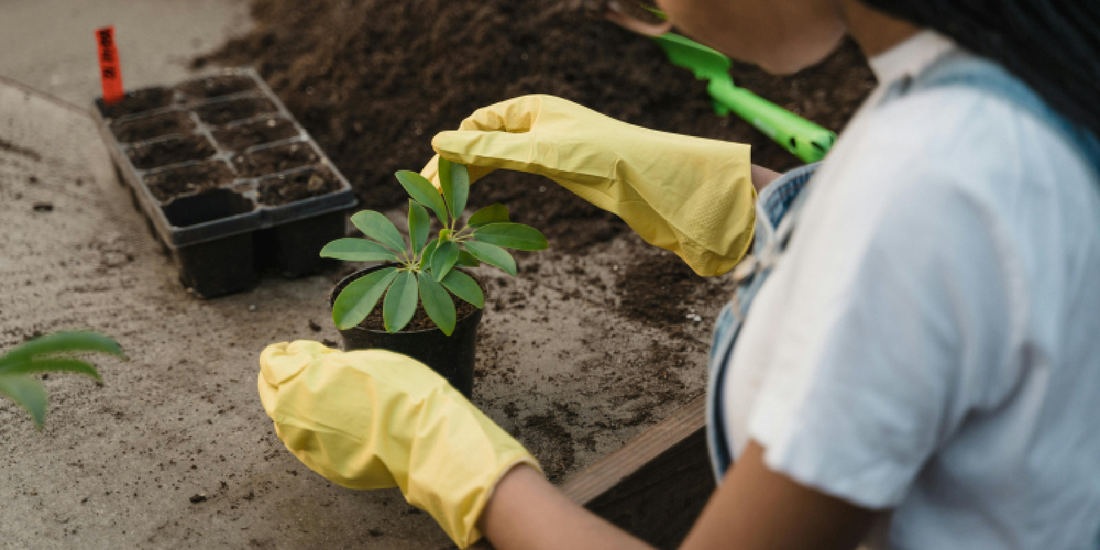
How to Grow Herbs with LED Grow Lights
Share
Introduction: Why Indoor Herb Gardening is Thriving
In today's fast-paced world, convenience meets sustainability in one of the simplest pleasures—growing your own herbs at home. Whether you live in a small apartment, a high-rise condo, or a house with limited outdoor space, an indoor herb garden is the perfect solution to keep fresh flavors at your fingertips. With the help of modern tools like LED grow lights and space-saving plant shelves, such as the amoyls VerdantGlow S-Shaped 8-Tier Plant Shelf, anyone can become a home gardener—no backyard required.
In this in-depth guide, we'll walk you through everything you need to know to grow herbs indoors using LED grow lights. From selecting the right herbs to understanding light cycles, setting up your space, and harvesting with care, this guide is your blueprint to success.
1. Benefits of Growing Herbs Indoors
Before we dive into the “how,” let’s explore the “why.” Growing herbs indoors with LED grow lights offers numerous benefits:
- Year-round gardening: No need to wait for spring or worry about frost.
- Fresh, organic herbs: Grow without pesticides or preservatives.
- Space efficiency: Perfect for urban dwellers or kitchen countertop gardeners.
- Aromatherapy & air purification: Many herbs like mint, basil, and rosemary also improve indoor air quality.
2. Best Herbs to Grow Indoors with LED Lights
While many herbs thrive indoors, some are especially well-suited for limited spaces and artificial lighting:
- Basil: Loves light, fast-growing, perfect for salads and pasta.
- Parsley: Great for windowsills and shelves, grows well under LEDs.
- Thyme: Compact and fragrant, ideal for soups and meats.
- Chives: Hardy and quick to regrow after cutting.
- Mint: Fast-growing and fragrant, but keep it contained.
- Oregano: A Mediterranean staple that does well in artificial light.
Tip: Stick to 3–5 types of herbs per shelf level to avoid overcrowding and to manage care easily.
3. Understanding LED Grow Lights for Herbs
Herbs require specific light conditions to photosynthesize and grow properly. Here's what to know:
Full-Spectrum LED Lights
Herbs grow best under full-spectrum lights that mimic natural sunlight. These lights emit both blue and red wavelengths:
- Blue Light (400–500nm): Supports leafy growth.
- Red Light (600–700nm): Encourages flowering and healthy stems.
Light Duration (Photoperiod)
- Seedlings: 14–16 hours/day.
- Mature plants: 12–14 hours/day.
- Rest Period: Always give plants 8 hours of darkness to mimic natural cycles.
Light Intensity & Distance
- Keep LED grow lights about 6–12 inches above the herbs.
- If herbs appear “leggy,” the light is too far away.
- Use adjustable shelves like the VerdantGlow to reposition lights and pots as plants grow.
4. Setting Up Your Indoor Herb Garden
Creating the right environment is key to successful indoor gardening. Here's how to do it using the amoyls VerdantGlow stand:
Choose the Right Location
- Place your plant stand in a well-ventilated area.
- Keep away from cold drafts or heating vents.
Use High-Quality Potting Mix
- Choose organic, well-draining potting soil.
- Avoid garden soil—it’s too heavy for indoor containers.
Pot Selection
- Use pots with drainage holes.
- Place trays underneath to catch excess water.
Shelving Tip:
The S-shaped design of the VerdantGlow stand helps spread light evenly across each level and keeps herbs within easy reach.
5. Watering and Humidity Tips
Indoor herbs need a different watering routine than outdoor ones:
- Water when the top 1 inch of soil is dry.
- Avoid letting roots sit in water—this leads to rot.
- Mist herbs like basil or parsley lightly if humidity is low.
Pro Tip: Overwatering is the #1 cause of failure in indoor herb gardening. When in doubt, wait a day.
6. Fertilizing Herbs Indoors
Herbs in containers need nutrients replenished regularly:
- Use a diluted organic liquid fertilizer every 2–4 weeks.
- Avoid over-fertilizing, which can reduce flavor intensity.
- Flush soil with plain water every few months to remove salt buildup.
7. Pruning and Harvesting for Healthy Growth
Herbs love to be harvested, and pruning promotes new growth.
- Basil: Pinch above a leaf node to encourage bushiness.
- Parsley & cilantro: Cut outer stems first, close to the base.
- Thyme & oregano: Trim with clean scissors just above a growth point.
Regular pruning:
- Prevents plants from going to seed (bolting).
- Keeps them compact and tidy.
- Encourages more flavorful leaves.
8. Troubleshooting Common Problems
Even with LED lights, you might run into issues. Here’s how to fix them:
|
Problem |
Cause |
Solution |
|
Yellowing leaves |
Overwatering |
Let soil dry more between watering |
|
Leggy growth |
Light too weak/far |
Move light closer or increase hours |
|
Mold on soil |
Poor airflow or overwatering |
Use fan, reduce water, improve drainage |
|
Wilting leaves |
Underwatering or root rot |
Adjust watering, check drainage holes |
9. Why Choose the amoyls VerdantGlow Shelf?
The amoyls VerdantGlow S-Shaped 8-Tier Plant Shelf is more than just a stand—it’s a full indoor gardening solution:
- Integrated full-spectrum LED lights on each tier
- Space-saving vertical design for small rooms or corners
- Modern aesthetic that complements any interior
- Flexible shelf spacing ideal for small herbs and larger containers
- Easy to assemble & sturdy build
This shelf is designed with both style and plant health in mind. Whether you’re growing herbs for cooking, decor, or aromatherapy, VerdantGlow supports your indoor gardening journey beautifully.
10. Bonus: Indoor Herb Garden Ideas by Use
Looking for inspiration? Here are some mini herb garden themes you can create on your VerdantGlow shelf:
- Cooking Essentials Shelf: Basil, thyme, rosemary, parsley
- Tea Lovers’ Corner: Mint, lemon balm, chamomile
- Aromatherapy Tier: Lavender, sage, oregano
- Medicinal Herb Garden: Calendula, echinacea, fennel
Label your pots and keep a mini notebook to track watering/fertilizing. Add decorative elements like small pebbles or miniature signs for personality.
Conclusion: Fresh Herbs, All Year Long
With the right setup, growing herbs indoors is easy, rewarding, and incredibly satisfying. LED grow lights make it possible to enjoy fresh basil in winter, mint in a high-rise kitchen, and thyme in a studio apartment.
Whether you’re a seasoned gardener or a complete beginner, the amoyls VerdantGlow S-Shaped Plant Shelf offers the perfect foundation for a vibrant, aromatic indoor herb garden that thrives—season after season.
